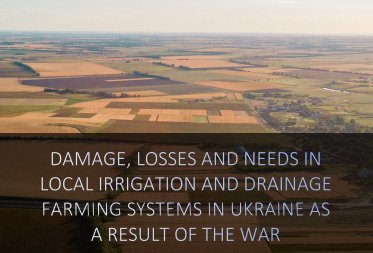NGO "Primavera" team successfully completed the task on the basis of a subcontract of the assignment within the framework of the project of WB and IWPLR (Institute of Water Problems and Land Reclamation of the National Academy of Agrarian Sciences) “Damage and Needs Assessment (RDNA) of private and community water and irrigation and drainage infrastructure at local level’.
The project implementation period: March 1 – April 25, 2023.
The first phase of Rapid Damage and Needs Assessment (RDNA) of water and irrigation infrastructure that was done by the World Bank assessed the damages from the war as of 1st June 2022. The RDNA was updated for the period from 1st June till 1st February 2023. The RDNA was based on the data collection on damages only at the level of large-scale state water infrastructure and the state-owned part of irrigation and drainage systems. The additional assessment of damages and needs of on-farm irrigation and drainage infrastructure was needed. This infrastructure belongs to the territorial communities or private famers and concern among others: sprinklers, drip irrigation equipment, water measurement and other equipment, pipes, canals, small local pump s tations, water storage ponds, drains and open collectors.
The results of RDNA at local level are an important component of the sectoral RDNA. The assessment moreover is important to evaluate support for farmers and communities for the rehabilitation of irrigation and drainage systems on the principle of “building back better”. Before the war, the government policy planned as a medium-term goal the restoration of 810,000 ha and possible further expansion to 1.5 million ha of irrigation systems as well as the upgrading of drainage systems within the 3 million ha of already drained areas, as well as possibly improvinnng water control in such systems in an area of 1 million ha.
Thus, it is critical, within the scope of the second RDNA assessment by the World Bank to collect data on on-farm irrigation and drainage systems in areas that are ‘deoccupied’ and under Ukrainian government control to understand the extent of damages and losses faced by farmers and their communities. The main objectives of the assignment are: to conduct an assessment of the damages and losses faced by private irrigators (on-farm irrigation damages and losses) as part of the RDNA 2 assessment for the irrigation and drainage sector. The main tasks of the project are the following:
To develop the survey plan for local level interviews with communities, communicate it to selected regional agriculture and water management departments, prepare an overview of current damage and select field assessment sites within including selecting target number of beneficiaries per area for the sample, and agreeing sampling methodology.
To organize field assessment to speak with local territorial communities (TC) and water users on the typical irrigations and drainage areas with visible damages to provide photo and video documentation of damages, evaluate the costs of damages and costs to build back better.
To develop maps on the categories of territories on results of local damage assessment based on the result of survey on the regional and TC levels and mapping of rocket attacks and mining of areas.
To coordinate the implementation of the assessment and collate all collected data and information so as to develop a draft final report from the field surveys for integration into the RDNA 2 irrigation and WRM chapter write-up.
Currently, the World Bank is finalizing the reporting materials to present the results of the RDNA project.





















